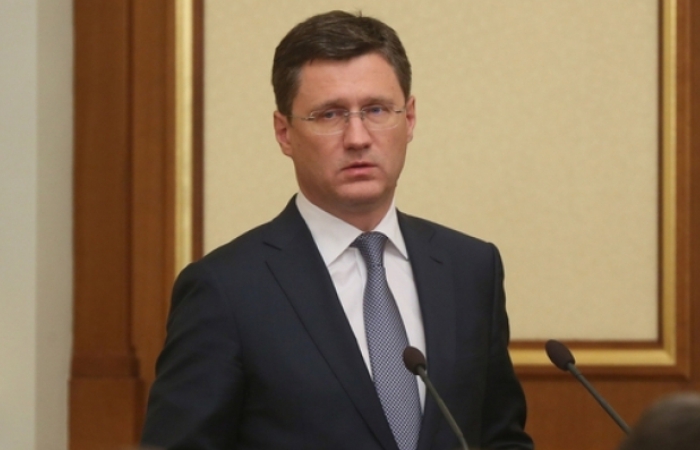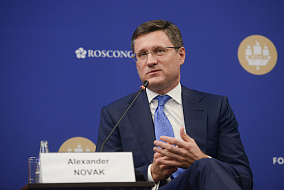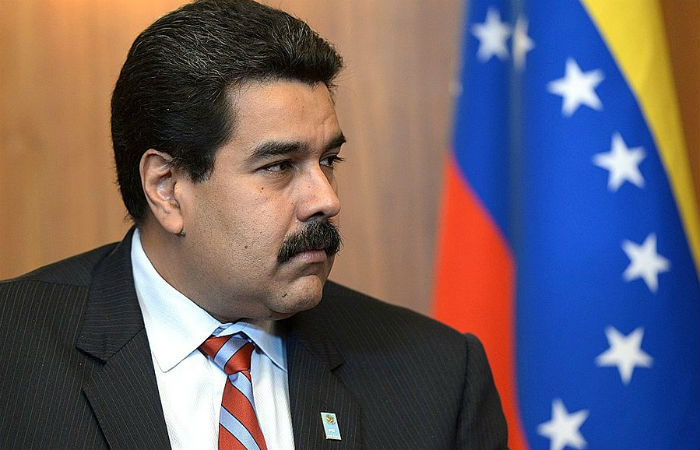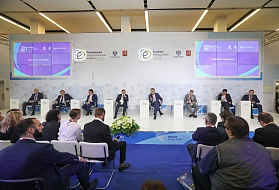October 19, 2017
 Moscow, 19 October. – The theme of developing energy efficiency and energy conservation, which was actively discussed during REW 2017, was one of the key issues on the agenda of a Russian Government meeting chaired by Russian Prime Minister Dmitry Medvedev.
Moscow, 19 October. – The theme of developing energy efficiency and energy conservation, which was actively discussed during REW 2017, was one of the key issues on the agenda of a Russian Government meeting chaired by Russian Prime Minister Dmitry Medvedev.
Even though Russia is a leader in the production of coal, oil, and gas, power generation as well as energy efficiency, Medvedev said the country is behind a substantial number of other countries, particularly in terms of the energy intensity of gross domestic product. “The potential for energy conservation is very high. It exists practically in all sectors. Above all, of course, in the fuel and energy industry itself”, Medvedev said.
Speaking about measures to support energy conservation, Medvedev noted that it is essential to make adjustments to the state management system in matters concerning energy conservation and energy efficiency, fine tune state support mechanisms, stimulate private business, and support Russian manufacturers of energy efficient equipment, modern meters, and energy conservation materials.
Russian Minister of Energy Alexander Novak noted in his report that a presidential decree issued in 2008 set the goal of reducing the energy intensity of gross domestic product by 40% by 2020 from the level of 2007. “Even though the rate of decline in energy intensity has been quite high in recent years and around the level of the world average (this year we expect a 1.7% decline), overall we have a total reduction of only 13% for this period (since 2008), which is below the planned figures. There are objective reasons for this, including lower GDP growth rates for this period as well as structural changes in the economy that had been planned, but the goals have not yet been achieved”, Novak said.
At the same time, Novak added that Russia ranked 17th in the World Bank’s rating of the state regulation of energy efficiency and joined the group of leaders. Moreover, virtually all sectors of the Russian economy have potential to improve energy efficiency, especially housing and utilities, the budget sector, transportation, industry, and the fuel and energy sector.
Novak said that the state policy in energy efficiency and energy conservation is currently being implemented in four areas.
“The first involves creating a system of state energy conservation management and introducing an energy management system at the state level, which, according to international experience, further enhances energy efficiency to 5%. The second focus of the state policy is the introduction of technological and environmental regulation in energy conservation. This includes introducing the best available technologies, energy efficient construction standards, and equipment requirements. The third area is the creation of economic incentives for projects in energy efficiency and ensuring their funding. And the fourth is promoting energy conservation”, Novak said.
In conclusion, Novak noted that a lot of work has been done in recent years to improve energy efficiency, but considerable potential still remains. “Energy efficiency and energy conservation are an inter-industry task and affect all areas of activity”, Novak said.
For his part, Russian Minister of Economic Development Maxim Oreshkin noted that the Russian Federation undertook obligations as part of the Paris Agreement in 2016 and that the reduction in greenhouse gas emissions can be almost entirely ensured by improving energy efficiency.
Oreshkin said that a plan has been developed to increase energy efficiency, which involves establishing an additional indicator for a reduction in the economy’s energy intensity due to the technology factor by industry.
“Implementing such a comprehensive plan will enable Russia not only to reach the targets it has set for energy efficiency, but will have a positive impact on the country’s economy overall and on the budget in particular. We should see increased competitiveness through a reduction in the cost of production and technological renovation in problematic sectors, including in housing and utility services. We will achieve the goals set as part of the Paris Agreement. And of course, the energy resources that are freed up will contribute to additional economic growth”, Oreshkin said.
Link to source: https://minenergo.gov.ru/node/9591
Russian Government discusses measures to develop energy efficiency and conservation

Even though Russia is a leader in the production of coal, oil, and gas, power generation as well as energy efficiency, Medvedev said the country is behind a substantial number of other countries, particularly in terms of the energy intensity of gross domestic product. “The potential for energy conservation is very high. It exists practically in all sectors. Above all, of course, in the fuel and energy industry itself”, Medvedev said.
Speaking about measures to support energy conservation, Medvedev noted that it is essential to make adjustments to the state management system in matters concerning energy conservation and energy efficiency, fine tune state support mechanisms, stimulate private business, and support Russian manufacturers of energy efficient equipment, modern meters, and energy conservation materials.
Russian Minister of Energy Alexander Novak noted in his report that a presidential decree issued in 2008 set the goal of reducing the energy intensity of gross domestic product by 40% by 2020 from the level of 2007. “Even though the rate of decline in energy intensity has been quite high in recent years and around the level of the world average (this year we expect a 1.7% decline), overall we have a total reduction of only 13% for this period (since 2008), which is below the planned figures. There are objective reasons for this, including lower GDP growth rates for this period as well as structural changes in the economy that had been planned, but the goals have not yet been achieved”, Novak said.
At the same time, Novak added that Russia ranked 17th in the World Bank’s rating of the state regulation of energy efficiency and joined the group of leaders. Moreover, virtually all sectors of the Russian economy have potential to improve energy efficiency, especially housing and utilities, the budget sector, transportation, industry, and the fuel and energy sector.
Novak said that the state policy in energy efficiency and energy conservation is currently being implemented in four areas.
“The first involves creating a system of state energy conservation management and introducing an energy management system at the state level, which, according to international experience, further enhances energy efficiency to 5%. The second focus of the state policy is the introduction of technological and environmental regulation in energy conservation. This includes introducing the best available technologies, energy efficient construction standards, and equipment requirements. The third area is the creation of economic incentives for projects in energy efficiency and ensuring their funding. And the fourth is promoting energy conservation”, Novak said.
In conclusion, Novak noted that a lot of work has been done in recent years to improve energy efficiency, but considerable potential still remains. “Energy efficiency and energy conservation are an inter-industry task and affect all areas of activity”, Novak said.
For his part, Russian Minister of Economic Development Maxim Oreshkin noted that the Russian Federation undertook obligations as part of the Paris Agreement in 2016 and that the reduction in greenhouse gas emissions can be almost entirely ensured by improving energy efficiency.
Oreshkin said that a plan has been developed to increase energy efficiency, which involves establishing an additional indicator for a reduction in the economy’s energy intensity due to the technology factor by industry.
“Implementing such a comprehensive plan will enable Russia not only to reach the targets it has set for energy efficiency, but will have a positive impact on the country’s economy overall and on the budget in particular. We should see increased competitiveness through a reduction in the cost of production and technological renovation in problematic sectors, including in housing and utility services. We will achieve the goals set as part of the Paris Agreement. And of course, the energy resources that are freed up will contribute to additional economic growth”, Oreshkin said.
Link to source: https://minenergo.gov.ru/node/9591





